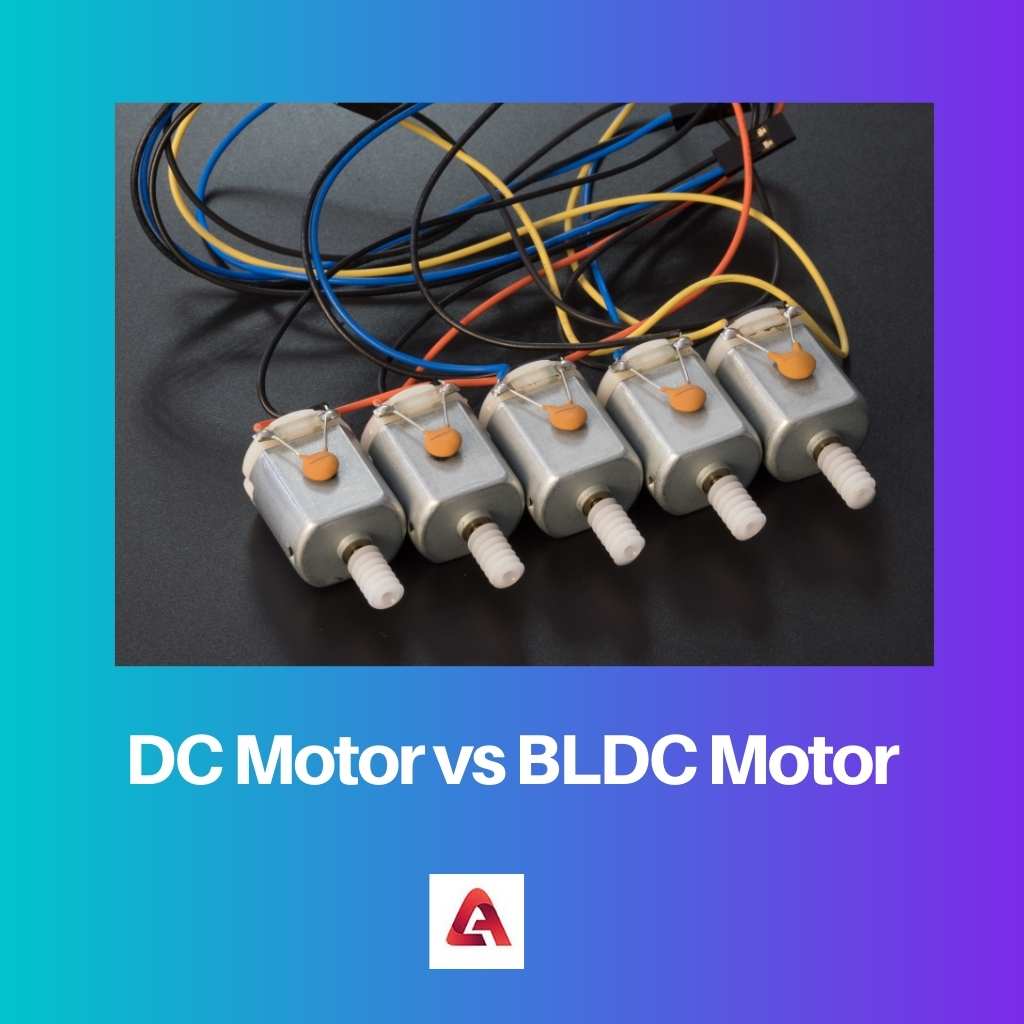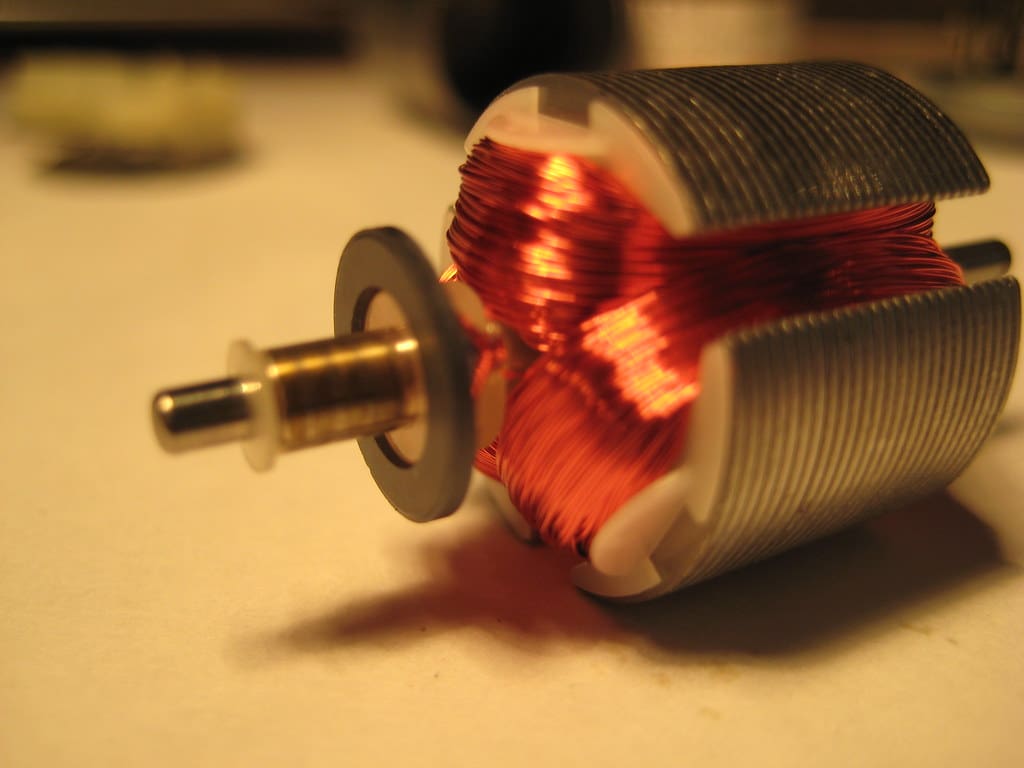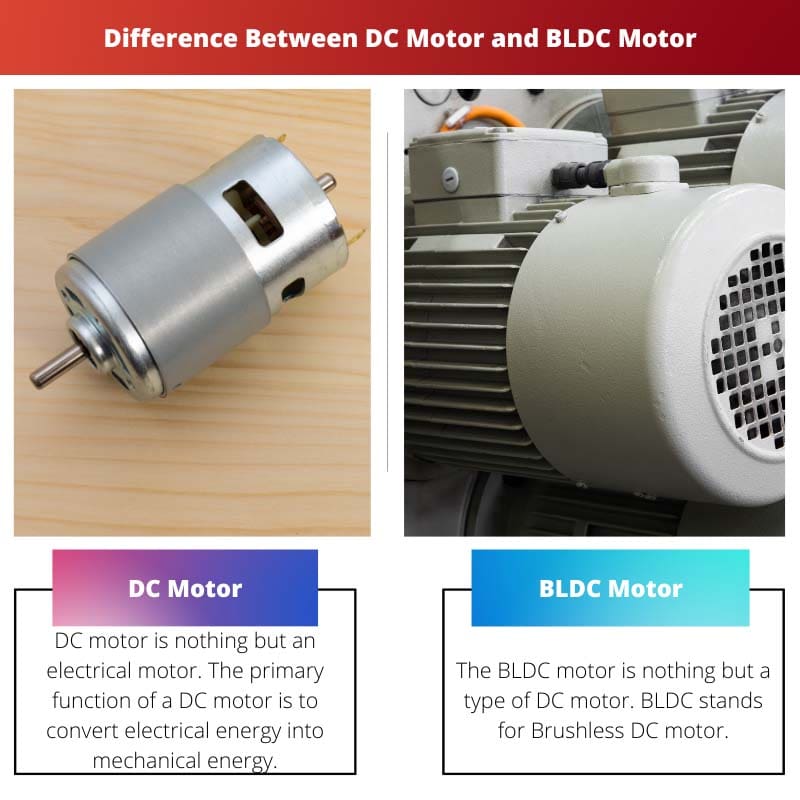Motors are playing a vital role in energy conservation and conversion. DC motors and brushless DC motors are two kinds of motors present in the machines for the conversion of electrical energy into mechanical energy.
Both the motors have similar parts with little difference on the brushes.
Key Takeaways
- DC (Direct Current) motors convert electrical energy into mechanical energy using brushes and a commutator, while BLDC (Brushless Direct Current) motors use electronic commutation and do not require brushes.
- BLDC motors are more efficient, have a longer lifespan, and require less maintenance than DC motors due to the absence of brushes.
- DC motors are simpler and less expensive than BLDC motors but may generate more noise and wear down more quickly due to brush friction.
DC Motor vs BLDC Motor
A DC Motor operates on direct current. It uses a commutator and brushes to switch the current direction, producing a magnetic field that drives the motor. BLDC Motors are electric motors that use electronic controls to switch the current in the coils, producing a magnetic field to drive the motor.

DC motor is nothing but an electrical motor. The primary function of a DC motor is to convert electrical energy into mechanical energy.
Depending on the forces produced by magnetic fields, the types of DC motor relies on. There are different types of DC are available in the market. The internal mechanism of the DC motor varies with the types.
It can change the direction of the current periodically. DC motor is widely used everywhere. It is known for its well-designed and easy-to-use nature. Many power distribution systems are connected to the DC motor.
The BLDC motor is nothing but a type of DC motor. BLDC stands for Brushless DC motor. It is also called BL motor. In these motors, Brushes are absent.
Other names of BLDC motors are Electronically commutated motor or synchronous motor. An electronic closed loop is used in BLDC to switch the DC to windings of the magnetic field.
Brushless DC motors work similarly to DC motors with a difference in the output execution. Brushless motors have electronic, unlike the brushed motors with use brushes for the switching of DC.
Comparison Table
| Parameters of comparison | DC Motor | BLDC Motor |
|---|---|---|
| Speed | DC motor has slow speed | BLDC motor has high speed |
| Control | Simple in DC motor | Complex in BLDC motor |
| Electrical noise | High in DC motor | Low in BLDC motor |
| Rotor inertia | High in DC motor | Low in BLDC motor |
| Efficiency | Moderate in DC motor | High in BLDC motor |
What is DC Motor?
DC motor is the first form of motor which converts directly into mechanical energy from electrical energy. The speed of the DC motor can be controlled in two different ways.
By maintaining the supply voltage or by maintaining the strength of the current you can control the speed of the DC motor. DC motors are available in distinct sizes.
The small DC motors have wide applications in toys and small machines. For the propulsion of electric vehicles and for lifting the elevators, large DC motors are used.
DC motors have many parts. The stator and armature present in the DC motor have a set of magnets. The set of magnets can be wrapped by an insulated wire that concentrates the magnetic field.
Multiple layers of windings will make in the magnetic field. Along with windings, parallel current paths are also present in large DC motors. The commutator is the end where the winding end is connected.
Every armature present in the DC motor will be energized by the commutator. The armature is further connected to the rotating coils to provide an external power supply.
The DC motor has two different types. Brushes DC motor and Brushless DC motor are the two different types of DC motor. In brushes DC motors.
The final armature connection is parallel with brushes that supply the output. In a brushless DC motor, mechanics are available, that change the current to each coil.

What is a BLDC motor?
BLDC motors have similar parts present in the DC motor except for the brushes. To control the speed and torque of the motor, the BLDC uses the controller to adjust the amplitude of the DC.
The controller present in BLDC is an alternative to the commutator present in the brushed DC motor. A permanent magnet synchronous system (PMSM) is somewhat similar to the production of the BLDC motors.
BLDC is nothing but a switched reluctance motor. The BLDC has neodymium magnets. BLDC motors have three types of stators. In-runners, out-runners, and axial. In the in-runner, the stators are covered by the rotor.
In out-runners, the stator surrounds the rotor. In axial both the stator and rotor are flat and parallel to each other. The high power ratio and high speed are the two primary advantages of the brushless DC motor.
You can instantly control the speed in BLDC motors. The brushless DC motors provide a high range of efficiency.
BLDC motors have a wide range of applications in computers components like disk drives and printers. It is widely used in modern aircraft.
BLDC become an essential part of washing machines. In 1960, the brushless DC motors are founded and launched in the market.
A servomechanism is used in BLDC motors as an alternative for the Commutators present in brushed motors.

Main Differences Between DC Motor and BLDC Motor
- When compared to DC motor, BLDC motor needs low maintenance.
- DC has less construction cost, whereas BLDC motor needs more construction cost.
- When compared to DC motor, BLDC motor has a high output power ratio.
- DC motors need no controller, whereas BLDC motors always need a controller.
- When compered DC motor, BLDC motor has a long life.

- https://ieeexplore.ieee.org/abstract/document/25542/
- https://ieeexplore.ieee.org/abstract/document/120220/
